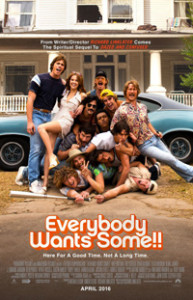Second Helpings: Linklater Hits the Joie de Vivre Sweet Spot
 Director Richard Linklater joyously returns to the nostalgia tipped obliviousness of youth with period piece Everybody Wants Some!!, which more or less plays like the spirit sister of his 1993 breakout Dazed and Confused. Incredibly textured characters, and a dog-eared affection for a particular shared experience framed with a rosy-tinted early 80s afterglow makes for a film throbbing with delightful energy and charm. Overcoming the weight of tediousness audiences have come to associate with male-dominated homosocial youth portraitures in the post-Apatow zeitgeist (this one selling itself as an alarming mixture of the frat/sports comedy, no less), it’s shaggy demeanor should quell more dubious critiques fingering these landscapes and these particular types of people too as too well tread to warrant attention. Following a trio of freshmen baseball players as they become acclimated to their elder teammates on a late August weekend in 1980 just before classes begin, it’s a condensed and contained examination of experience as defined by time, and exudes the auteur’s particular fascinations with these motifs as compellingly as his previous film, the awards hounded sensation Boyhood (2014).
Director Richard Linklater joyously returns to the nostalgia tipped obliviousness of youth with period piece Everybody Wants Some!!, which more or less plays like the spirit sister of his 1993 breakout Dazed and Confused. Incredibly textured characters, and a dog-eared affection for a particular shared experience framed with a rosy-tinted early 80s afterglow makes for a film throbbing with delightful energy and charm. Overcoming the weight of tediousness audiences have come to associate with male-dominated homosocial youth portraitures in the post-Apatow zeitgeist (this one selling itself as an alarming mixture of the frat/sports comedy, no less), it’s shaggy demeanor should quell more dubious critiques fingering these landscapes and these particular types of people too as too well tread to warrant attention. Following a trio of freshmen baseball players as they become acclimated to their elder teammates on a late August weekend in 1980 just before classes begin, it’s a condensed and contained examination of experience as defined by time, and exudes the auteur’s particular fascinations with these motifs as compellingly as his previous film, the awards hounded sensation Boyhood (2014).
Linklater’s (familiar) soundtrack selection enhances the particular tone, and much like Foghat’s “Slow Ride” dictated a certain groove in Dazed and Confused, The Knack’s “My Sharona” christens Everybody Wants Some!! as Jake’s (Blake Jenner) Oldsmobile cruises down suburban Texas streets and arrives in front of a dilapidated looking house donated by the city to accommodate the university’s baseball team. A new pitcher, his arrival is less than salutary following his first interaction with alpha male McReynolds (Tyler Hoechlin), a young man cut from the Tom Selleck cloth, who announces, “I hate pitchers.” Thankfully, the other teammates seem less aggressive, many of them representative of certain types of people, like resident Carl Sagan obsessed pothead and transferred senior Willoughby (Wyatt Russell), socially awkward black sheep Jay Niles (Juston Street) and affable steward Dale (J. Quinton Johnson), the only non-white member of their clan. Joining two other freshmen teammates, Plummer (Temple Baker), and his perpetually distracted roommate, Billy Autrey (Will Brittain), Jake struggles to reconcile making a good impression while staying true to himself, while exploring different facets of his personality with the team’s Kerouac touting ladies’ man, Finnegan (Glen Powell).
As its title would seem to indicate, Everybody Wants Some!! isn’t without a certain hormonally coated energy, and is more a nicely moderated portrait of male bonding without an excessive amount of off-putting, misogynist and homophobic shenanigans usually accompanying such environments. Most of the actors playing these core characters are making their screen debuts, with exceptions being Wyatt Russell (son of Kurt and Goldie Hawn), who will probably earn comparisons to the Matthew McConaughey character in Dazed. But the film rests comfortably in the spirit of Jenner’s Jake, the actor sailing comfortably from “Glee” and ‘Supergirl” into an appealing lead. The film shines whenever he’s paired with Powell’s Finnegan, the quick-witted smooth talker who invitingly persuades women to converse about his average sized penis. Though the film is slim on female characters, Zoey Deutch instills the second hour with a bit of grace and has authentic chemistry with Jenner (although the magical party staged by the theater students seems a bit too polished to be believable).
As an articulate rendering of a particular moment in time, youths navigating identities as they cross the threshold from free form adolescence to college careers culling personal taste and evolving values, Everybody Wants Some!! is quite potent. True, this prizes a specific perspective, the heterosexual white male (one could add Texan and privileged to the list), and it arguably stops short of a universality more readily evident in the two other Linklater titles this latest most easily converses with.
More interesting is how Linklater chooses to navigate a pronounced timeline this time around, eschewing the real-time markers of Slacker (1991), for instance. Instead, it’s a series of interactions and conversations forever defining this particular weekend for its principal characters, and Linklater straddles the precarious line of managing authenticity while appearing winsome.
★★★½/☆☆☆☆☆


